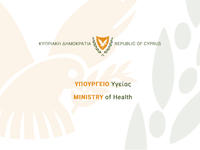Press Releases
18-05-2021 14:54
Minister of Health: Vaccination and compliance with the precautionary measures will lead to the lifting of more restrictions
“We all need to cooperate and comply with the measures, until the goal we have set for the vaccination coverage of over 65% of the population is achieved”, the Minister of Health, Mr Constantinos Ioannou stated, while emphasizing, at the same time, that the only way to limit the mutations of the virus is vaccination.
Replying to questions of media representatives during a press conference on the next steps of the National Vaccination Plan, the Minister explained that, regarding the scheduling of appointments through the Portal, “the opportunity will be given again through the Portal, and there is always the option through Personal Doctors, for those who had only one opportunity until today. We have already started the scheduling; last weekend the opportunity was given to people aged 50-60 who had the opportunity once until today. Due to the fact that the Portal had crashed twice, the opportunity will be given again to the ages 61-65 as of Wednesday and as of Friday and in the following days or weeks we will start with the ages 46-49, then we will proceed to the 43-45 ages, and depending on the availability of vaccines, we will go to up to the 18-year-olds, since the opportunity was given to them only once through the Portal. So it will be done gradually and depending on the availability of vaccines. I do not know how long it will take to get to the18-year-old age group again; it could be 3 or 4 weeks. It also depends on the public’s response. But this is our goal so that, in a fair and just way, the opportunity will be given again to them to arrange their appointment, as it was given to the older ages several times so far.
However, I repeat that there is also the possibility to arrange an appointment through their Personal Doctors. It is a process that is running simultaneously, with very good and encouraging results to date, with 320 doctors participating and over 26,000 doses having been sent, and already around 1,500 vaccinations per day are being administered by the Personal Doctors”.
Replying to a question regarding the rescheduling process of the 2nd dose of the AstraZeneca vaccine, the Minister of Health repeated that, those who have completed the 8 weeks will be informed via a text message, and by the end of next week everyone will be gradually informed about their appointment. The Minister said this concerns around 60,000 people.
Asked whether there are any thoughts of administering a 3rd vaccine dose, Mr Ioannou explained that there should be no discussion at this stage, since it has not been scientifically documented yet. “We are waiting for the scientific documentation on whether it is needed and when. The important thing is that there is the infrastructure, there are enough vaccines for the next months and in fact for the next two years, because we have ordered 4 million doses of vaccines. From the summer onwards, we will receive even more quantities, so we, as a Ministry, are not worried as to whether and when the decision for a 3rd dose will be adopted, because both the infrastructure and the vaccines exist”, he noted.
Replying to the same question, the Deputy Director of the Pharmaceutical Services, Ms Elena Panayiotopoulou, stated that the European Medicines Agency has not yet issued a directive for the administration of a 3rd dose. The issue, she said, is likely to be addressed at a European level in June.
Asked to comment on whether there are any thoughts of making more vaccines available to personal doctors, other than AstraZeneca, Mr Ioannou said that for the time being there is no such intention. “Possibly in June and depending on availability. Other vaccines cannot be offered for the time being due to practical reasons (for example special storage conditions for Pfizer)”, he said.
Asked about the quantities expected in the immediate future, the Minister of Health said that we receive approximately 30,000 Pfizer doses per week, while from June 1st, according to the company, this is expected to increase to 50,000 until the end of June. Regarding AstraZeneca, Mr Ioannou said that the planning provided by the company only covers 2 weeks, which creates planning issues for countries, as well as the fact that for some of their deliveries, they did not meet their commitments. In theory, 100,000-150,000 doses should be delivered in June. Regarding Johnson&Johnson, quantities have not been delivered to all of the EU this week, but the doses we will receive in June are 35,000. Finally, we will receive approximately 30,000-40,000 doses from Moderna. “In conclusion, quantities are enough to reach the target we have set for administering at least one dose to over 65% of the population. Thus, the ability is there when it comes to the number of doses”, Mr Ioannou said.
In response to a question regarding the mutations of the virus and whether their detection within the community affects the improved epidemiological indicators, the Minister of Health explained that samples are being sent to ECDC on a weekly basis for specialized analysis. As Mr Ioannou highlighted, Cyprus is probably the only country in the EU that “follows very strict testing measures at airports. I would like to repeat that most of the countries in the EU, as well as some third countries, are ranked in the Red Category, which means that passengers arriving in Cyprus must display two negative PCR tests within 72 hours. We ensure prevention of transmission by requesting two negative tests. As far as I know, no other country in the EU does this. Germany, for example, intends to take measures for arrivals from the United Kingdom, and this means requesting a PCR test. For countries outside the EU that are ranked in the Grey Category, such as India, arriving passengers will need to self-isolate for 14 days. Therefore, all these strict measures are followed at airports. However, this does not eliminate the possibility that virus strains will be observed. I would like to point out that since December, we have been taking measures for passengers arriving from the United Kingdom, hosting their self-isolation in hotels with expenses covered by the state, and that until March, the British strain had been dominant. It is not easy to contain it, and the only way to protect ourselves from these mutations is through vaccination. To this end, everybody is working towards accelerating their vaccination plan, in order to prevent the spread of mutated strains through vaccinations”.
Invited to say whether there is intention for further de-escalation of measures due to the improvement of the epidemiological picture, the Minister emphasized that the epidemiological data are evaluated every week. As he characteristically stated, “further relaxations are not the important issue at the moment. Right now, the important thing is that Cyprus – and I can say throughout the whole period of the pandemic – had more relaxations and less limitations at any given moment from almost any other EU member state. This was achieved as a result of the sacrifices and the collaboration of citizens towards the implemented measures, especially regarding the targeted implementation of COVID-19 testing. The reason of last February’s re-opening, under low vaccination coverage – given that other countries’ economies are now opening due to vaccinations – was exactly our ability to carry out targeted tests on a daily and weekly basis, which allowed for the cases to be traced and isolated in time. That was what enabled our economy to function, with less consequences than any other EU member state”. As he said, in the current phase, the epidemiological conditions are evaluated weekly, even though enough relaxations were offered and only minor specific ones can be offered.
“What is important is to communicate once again the message that people’s collaboration is needed, to follow the measures. Right now, we are the solution. Relaxations are there, tests are there for people to enable us to supervise the overall picture so that we do not derail again, vaccinations are conducted, and now it is up to each one of us to comply with the measures in order to maintain this picture. This is the message. We all have to collaborate to preserve the current picture during the following weeks until we reach the necessary vaccination coverage. Some minor measures may continue to be in force afterwards, but basically, by the end of June and having achieved the necessary vaccination coverage, we will be able to lift most of the limitations”, Mr Ioannou underlined.
To a question whether the thought of opening the Vaccination Portal without the age restriction for the administration of AstraZeneca vaccine will proceed, the Minister of Health repeated that the aim is to give another opportunity to those who had only once the chance to arrange their appointments, to do so. “Once the process is complete, and depending to where we stand, i.e. in terms of coverage until that time, the aim is that the Portal remains open regardless of age, and the vaccines to be available at the Portal so that people can choose. This depends on the coverage. If the response continues to be as encouraging as now, we will be able to proceed with this specific planning. Otherwise, there must be a reassessment. The target is anyway to reach again the 18 year olds and then the Portal will be open for everyone regardless of age, either for some days for those over 30 or under 30, depending on the individuals who will have not been administered with the vaccine and on the Portal’s ability to host visits per day”, he pointed out.
Finally, being asked to reply whether there was a timetable, even in draft, on when the tests can stop given the vaccination coverage, the Minister of Health mentioned that every passing week, the number of those who need to be tested is decreasing. It is not easy to say now when this will stop, he continued. Possibly, according to the Minister, it is necessary to continue this in the following months, so that there is monitoring of the situation, at least for the percentage of people who will not be vaccinated. “The number of tests will be decreasing as the vaccination coverage increases”, Mr Ioannou concluded.
(MV/NG/AP/MPO/EK)
Relevant Press Releases









